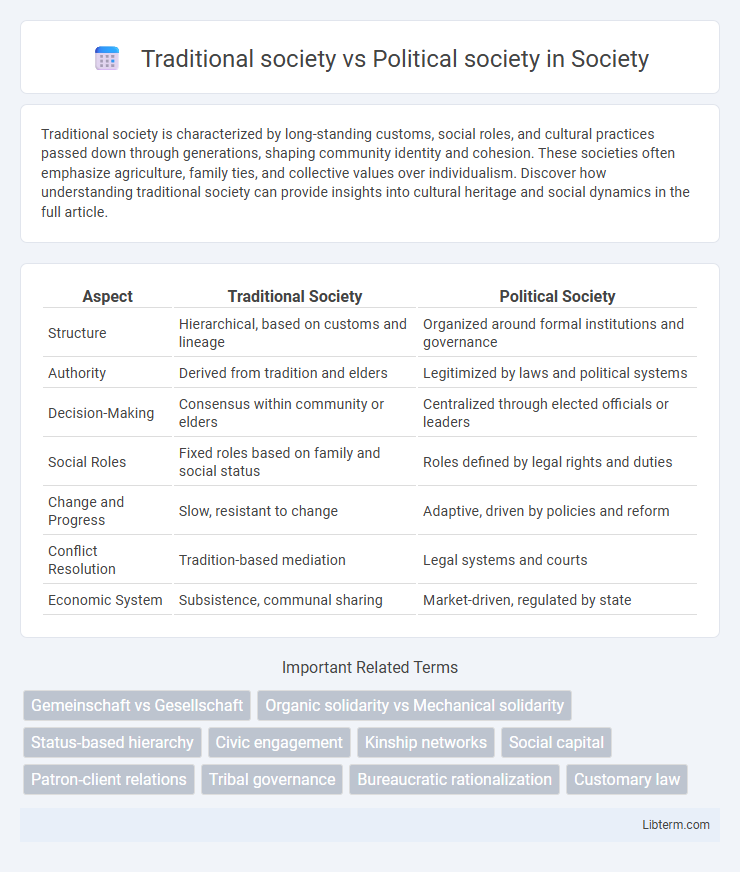Traditional society is characterized by long-standing customs, social roles, and cultural practices passed down through generations, shaping community identity and cohesion. These societies often emphasize agriculture, family ties, and collective values over individualism. Discover how understanding traditional society can provide insights into cultural heritage and social dynamics in the full article.
Table of Comparison
| Aspect | Traditional Society | Political Society |
|---|---|---|
| Structure | Hierarchical, based on customs and lineage | Organized around formal institutions and governance |
| Authority | Derived from tradition and elders | Legitimized by laws and political systems |
| Decision-Making | Consensus within community or elders | Centralized through elected officials or leaders |
| Social Roles | Fixed roles based on family and social status | Roles defined by legal rights and duties |
| Change and Progress | Slow, resistant to change | Adaptive, driven by policies and reform |
| Conflict Resolution | Tradition-based mediation | Legal systems and courts |
| Economic System | Subsistence, communal sharing | Market-driven, regulated by state |
Defining Traditional Society
Traditional society is characterized by its reliance on longstanding customs, kinship ties, and communal values rather than formal political institutions. Social organization in traditional societies is primarily governed by hereditary leaders, elders, or tribal chiefs who hold authority based on tradition and consensus. Unlike political society, where centralized institutions and codified laws dominate, traditional societies emphasize social cohesion through cultural norms and rituals.
Understanding Political Society
Political society is characterized by formal institutions and legal frameworks that regulate power through laws and governance structures, contrasting with traditional society's reliance on customary rules and kinship ties. Understanding political society involves recognizing the emergence of centralized authority, codified rights, and bureaucratic mechanisms designed to administer justice and maintain order within a defined territory. This evolution reflects the shift from personal loyalty and informal leadership to institutionalized power and political legitimacy.
Historical Context and Evolution
Traditional society, rooted in kinship, customs, and collective norms, dominated human organization for millennia, characterized by decentralized power and social hierarchies based on lineage and tradition. Political society emerged during the Enlightenment and modern state formation, emphasizing centralized authority, legal-rational governance, and codified political institutions to regulate social order and individual rights. The historical evolution from traditional to political society reflects a transition from organic, customary norms to institutionalized laws and bureaucratic governance structures shaping modern nation-states.
Core Values and Norms
Traditional society values collective well-being, customs, and long-established social roles, emphasizing conformity to inherited norms and communal harmony. Political society prioritizes individual rights, legal frameworks, and institutional governance, focusing on formal laws and procedural justice to regulate behavior. Core values in traditional societies revolve around social cohesion and cultural continuity, while political societies emphasize legitimacy, representation, and rule of law.
Authority and Leadership Structures
Traditional society features authority rooted in customs, kinship, and long-established rituals, where leadership is often hereditary and based on lineage or spiritual legitimacy. Political society centers authority within formal institutions and legal frameworks, emphasizing elected or appointed leaders with defined roles and governance responsibilities. Leadership in political society relies on codified power structures and bureaucratic systems, contrasting with the personal and communal basis of authority in traditional contexts.
Role of Law and Custom
In traditional society, customs function as the primary regulatory framework, guiding behavior through unwritten norms deeply embedded in cultural practices. Political society relies on codified laws established by governing institutions, ensuring order through formal legal systems and enforcement mechanisms. The role of law in political society contrasts with the customary rules in traditional society by emphasizing centralized authority and standardized legal codes over communal consensus.
Community Participation and Governance
Traditional society emphasizes community participation through kinship networks and customary practices, where governance is often decentralized and rooted in local consensus and rituals. Political society prioritizes structured governance with formal institutions and legal frameworks, promoting participation through electoral processes and bureaucratic systems. Both systems influence how authority is exercised, but traditional societies rely more on cultural legitimacy while political societies depend on codified laws and official mandates.
Social Cohesion and Conflict Resolution
Traditional society relies heavily on kinship ties and shared customs to maintain social cohesion, fostering strong community bonds through collective rituals and mutual obligations. Conflict resolution in these societies typically involves mediation by elders or respected leaders using customary laws and oral traditions to restore harmony. Political society, in contrast, utilizes formal institutions and legal frameworks to enforce social order, integrating diverse groups under centralized authority which organizes conflict resolution through codified laws and official judiciary processes.
Impact on Individual Rights and Freedoms
Traditional societies often emphasize collective norms and customs, limiting individual rights and freedoms to preserve social harmony and cultural continuity. Political societies prioritize codified laws and institutional governance, providing legal protections that enhance individual rights and promote personal freedoms. The shift from traditional to political structures marks a significant evolution in balancing communal obligations with individual autonomy.
Contemporary Relevance and Challenges
Traditional society, characterized by kinship ties and customary authority, faces challenges in adapting to modern governance frameworks that prioritize state sovereignty and legal institutions, often leading to conflicts over legitimacy and resource management. Political society, based on formal political institutions and state power, struggles with inclusivity and representation, especially in regions where traditional structures remain influential. Contemporary relevance lies in the need to integrate traditional norms within political systems to ensure social cohesion and sustainable development in multicultural and post-colonial states.
Traditional society Infographic

 libterm.com
libterm.com